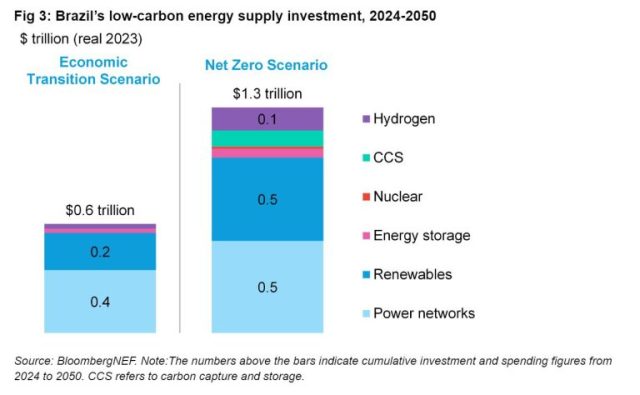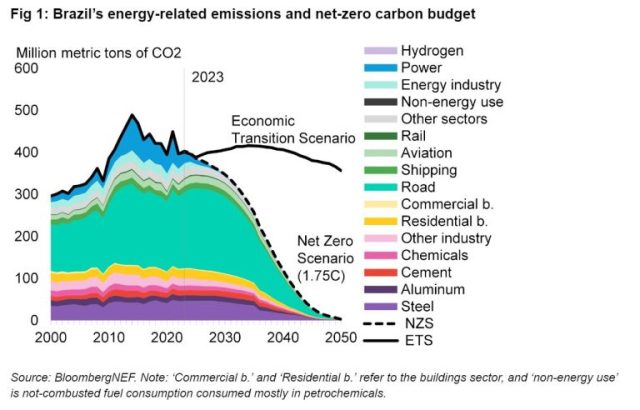As the President of the G-20 and the host of COP30 in 2025, Brazil has a unique opportunity to lead the global shift toward a low-carbon economy. However, according to the Brazil Transition Factbook by BloombergNEF (BNEF), achieving its decarbonization goals will require substantial investment across multiple clean energy technologies.
The report outlines that Brazil’s energy-related emissions must decrease by 14 percent by 2030 and 70 percent by 2040 to align with BNEF’s Net Zero Scenario, which charts a path to net-zero emissions by 2050 while limiting global warming to below 2°C.
Brazil has already emerged as a top destination for renewable energy investment. In 2023, the country attracted nearly $35 billion, ranking sixth globally and leading all emerging markets outside of China. Brazil is also the third-largest wind and solar market in the world, adding a record 5 gigawatts (GW) of onshore wind and 16 GW of solar capacity last year.
However, to stay on track for net zero, Brazil needs to invest over $1.3 trillion in low-carbon energy supply between 2024 and 2050, including $500 billion in renewable energy. This represents a significant opportunity for private-sector investment, especially as clean energy will play a crucial role in electrifying Brazil’s transport, buildings, and industry sectors. According to the report, electrification could account for 53 percent of emissions avoided between now and 2050, while demand-side investments, particularly in electric vehicles, could drive $4.3 trillion in spending.

Key Findings of the Brazil Transition Factbook:
Critical Source of Transition Metals: Brazil ranks third globally in transition metals reserves, holding over 15 percent of the world’s graphite, iron ore, rare earths, nickel, and manganese reserves, making it crucial for the global energy transition.
Green Hydrogen Potential: After passing its clean hydrogen law in August 2024, Brazil could produce the lowest-cost green hydrogen globally, a key enabler for decarbonizing industries like steel.
Clean Steel Production: Thanks to abundant biomass and low electricity prices, Brazil is on track to have the world’s cheapest net-zero emissions steel by 2030.
Biofuels as a Transition Tool: While electric vehicle adoption is growing, biofuels remain essential in the short term for decarbonizing Brazil’s large passenger vehicle market.
Sustainable Finance Leadership: Brazil is leading the region in sustainable finance, with policies that could make green reporting mandatory, following in the footsteps of the EU and UK.
Ambitious Corporate Targets: Brazil’s top 10 companies with net-zero goals must cut their emissions by 177 million metric tons of CO2 equivalent annually to meet their targets.
Nature-Based Carbon Offsets: Brazil has the potential to create up to 30.5 gigatons of nature-based carbon offsets by 2050, more than the next three largest countries combined.
Luiza Demoro, Global Head of Energy Transitions at BloombergNEF, highlighted Brazil’s pivotal role, saying, “With abundant natural resources and immense potential in clean energy, climate, and nature sectors, the country is uniquely positioned to help drive global decarbonization efforts. However, to harness this opportunity and unlock capital flows at scale, Brazil must urgently develop, enact, and implement robust policies and regulations, while addressing market barriers.”

